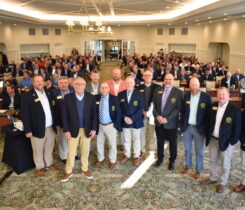“Tournament ready” an everyday mindset at Lancaster CC
Editor’s note: This article from Bayer CropScience is the first in a multi-part series by the company featuring plant health and tournament readiness leading into premier golf championships across the United States.
At Lancaster Country Club, superintendent Todd Bidlespacher is fully dedicated to nurturing tournament-ready greens every day of the year – particularly leading into this week’s U.S. Women’s Open, the first major tournament hosted at Lancaster CC.
But when the 31-hole golf course was first designed by William S. Flynn nearly 100 years ago, it wasn’t intended to host a tournament of this magnitude. Coupled with unpredictable weather and the winding Conestoga River that cuts the course in half, the ability to control flooding, to maintain turf at peak performance and to prepare for a flawless tournament can be tricky.
When Bidlespacher first joined Lancaster CC in 2003, the greens struggled through the summer, and he saw frequent issues with organic littering (thatch). He and his crew worked sunrise to sunset for three years, verticutting, aerifying and eliminating the organic layer.
“In 2010, we finally decided that we needed to do something – especially with the tournament looming,” Bidlespacher said. “We pulled the trigger to re-grass and were able to grow mature greens in time for the tournament. Right now, the greens are Poa free.”
To further optimize course playability, Bidlespacher introduced a fungicide program with plant health support from Bayer Stressgard® Formulation Technology to help improve root function, retention, turf color and stress resistance. According to Bidlespacher, he is very satisfied with the programs he has in place and doesn’t anticipate tightening up or altering his programs in the near term.
“Day in and day out, we try to keep championship level conditioning. Your course is only as good as it was yesterday,” Bidlespacher said. “Tournaments help draw interest, but we have to do our part to provide a great product. That’s for sure.”
Bidlespacher added that he is fully confident in the health of the playing space. In fact, he is more concerned about what will go on outside the tournament ropes — mechanical damage and heavy foot traffic, especially. A lot will hinge on the weather, but Bidlespacher is confident that hard work on the front end with a dependable fungicide program and careful preparation will mean stronger performance and quicker recovery on the back end.
“We’ve gotten more aggressive with our cutting heights moving into the tournament, but it’s gone very smoothly. No issues,” Bidlespacher said. “I think a big reason for that is the plants are much healthier. They wilt less and require a lot less hand-watering. Stressgard added a little extra in terms of the broad spectrum of plant health.”
To ensure the tournament is as successful as possible, Bidlespacher has also been working closely with Scott Irwin, general manager, to coordinate how best to host the event while maintaining as much normalcy and limited disruption as possible.
“Most of the projects we do are for the membership,” Bidlespacher said. “The tournament is just a bonus.”
Bidlespacher’s commitment to plant health and ongoing collaboration with course leadership has been a crucial element to ensuring the success of the Women’s U.S. Open.
©2015 Bayer CropScience LP, 2 T.W. Alexander Drive, Research Triangle Park, NC 27709. Always read and follow label instructions. Bayer and the Bayer Cross and Stressgard are registered trademarks of Bayer. For additional product information call toll-free 1-866-99-BAYER (1-866-992-2937) or visit our website at www.BayerCropScience.us











